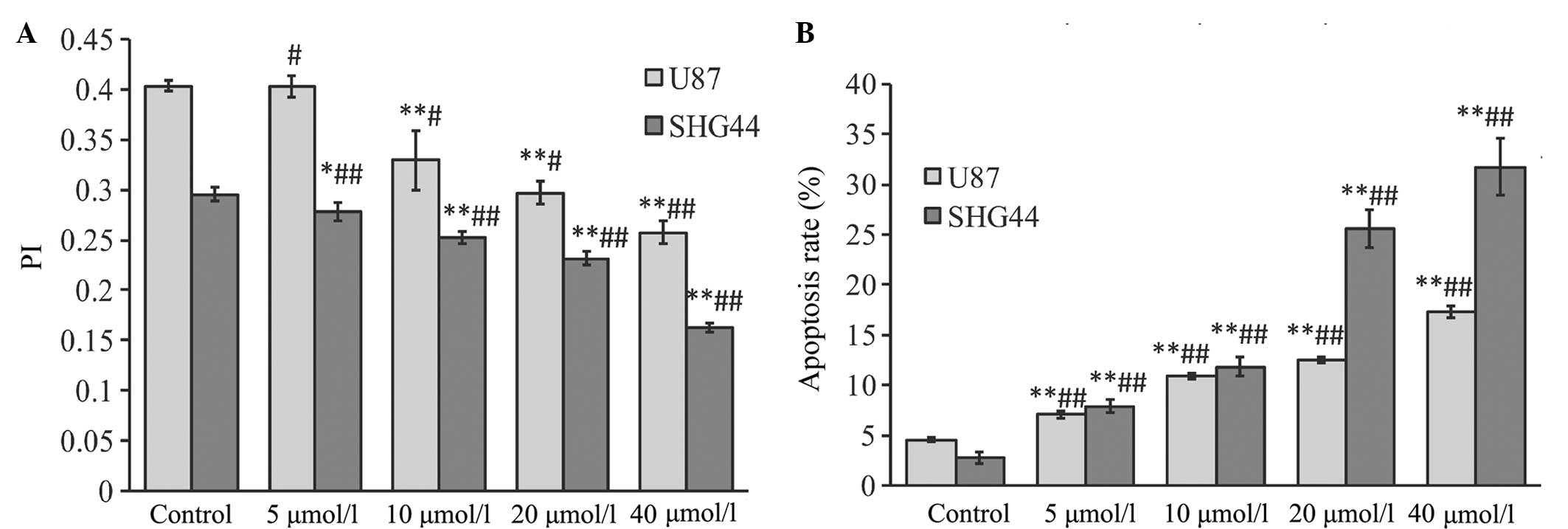|
1
|
Nishikawa R: Standard therapy for
glioblastoma - a review of where we are. Neurol Med Chir (Tokyo).
50:713–719. 2010. View Article : Google Scholar : PubMed/NCBI
|
|
2
|
Clarke J, Butowski N and Chang S: Recent
advances in therapy for glioblastoma. Arch Neurol. 67:279–283.
2010. View Article : Google Scholar : PubMed/NCBI
|
|
3
|
Stupp R, Mason WP, van den Bent MJ, et al:
European Organisation for Research and Treatment of Cancer Brain
Tumor and Radiotherapy Groups; National Cancer Institute of Canada
Clinical Trials Group: Radiotherapy plus concomitant and adjuvant
temozolomide for glioblastoma. N Engl J Med. 352:987–996. 2005.
View Article : Google Scholar : PubMed/NCBI
|
|
4
|
Zang C, Wachter M, Liu H, et al: Ligands
for PPARgamma and RAR cause induction of growth inhibition and
apoptosis in human glioblastomas. J Neuroncol. 65:107–118. 2003.
View Article : Google Scholar
|
|
5
|
Tang K, Cao L, Fan SQ, et al: Effect of
all-trans-retinoic acid on C6 glioma cell proliferation and
differentiation. Zhong Nan Da Xue Xue Bao Yi Xue Ban. 33:892–897.
2008.PubMed/NCBI
|
|
6
|
Chang Q, Chen Z, You J, et al:
All-trans-retinoic acid induces cell growth arrest in a human
medulloblastoma cell line. J Neurooncol. 84:263–267. 2007.
View Article : Google Scholar : PubMed/NCBI
|
|
7
|
Li S, Gao Y, Pu K, Ma L, Song X and Liu Y:
All-trans retinoic acid enhances bystander effect of suicide-gene
therapy against medulloblastomas. Neurosci Lett. 503:115–119. 2011.
View Article : Google Scholar : PubMed/NCBI
|
|
8
|
Das A, Banik NL and Ray SK: Molecular
mechanisms of the combination of retinoid and interferon-gamma for
inducing differentiation and increasing apoptosis in human
glioblastoma T98G and U87MG cells. Neurochem Res. 34:87–101. 2009.
View Article : Google Scholar : PubMed/NCBI
|
|
9
|
Haque A, Banik NL and Ray SK: Emerging
role of combination of all-trans retinoic acid and interferon-gamma
as chemoimmunotherapy in the management of human glioblastoma.
Neurochem Res. 32:2203–2209. 2007. View Article : Google Scholar : PubMed/NCBI
|
|
10
|
Zhang R, Banik NL and Ray SK: Combination
of all-trans retinoic acid and interferon-gamma upregulated
p27(kip1) and down regulated CDK2 to cause cell cycle arrest
leading to differentiation and apoptosis in human glioblastoma LN18
(PTEN-proficient) and U87MG (PTEN-deficient) cells. Cancer
Chemother Pharmacol. 62:407–416. 2008. View Article : Google Scholar : PubMed/NCBI
|
|
11
|
Karmakar S, Banik NL, Patel SJ and Ray SK:
Combination of all-trans retinoic acid and taxol regressed
glioblastoma T98G xenografts in nude mice. Apoptosis. 12:2077–2087.
2007. View Article : Google Scholar : PubMed/NCBI
|
|
12
|
Karmakar S, Banik NL and Ray SK:
Combination of all-trans retinoic acid and paclitaxel-induced
differentiation and apoptosis in human glioblastoma U87MG
xenografts in nude mice. Cancer. 112:596–607. 2008. View Article : Google Scholar : PubMed/NCBI
|
|
13
|
Onishi M, Ichikawa T, Kurozumi K and Date
I: Angiogenesis and invasion in glioma. Brain Tumor Pathol.
28:13–24. 2011. View Article : Google Scholar : PubMed/NCBI
|
|
14
|
Livak KJ and Schmittgen TD: Analysis of
relative gene expression data using real-time quantitative PCR and
the 2(-Delta Delta C(T)) method. Methods. 25:402–408. 2001.
View Article : Google Scholar : PubMed/NCBI
|
|
15
|
Dutta A, Sen T and Chatterjee A: All-trans
retinoic acid (ATRA) downregulates MMP-9 by modulating its
regulatory molecules. Cell Adhes Migr. 4:409–418. 2010. View Article : Google Scholar
|
|
16
|
Yang P, Liu Z, Wang H, et al: Enhanced
activity of very low density lipoprotein receptor II promotes
SGC7901 cell proliferation and migration. Life Sci. 84:402–408.
2009. View Article : Google Scholar : PubMed/NCBI
|
|
17
|
Lan L, Cui D, Luo Y, Shi BY, Deng LL,
Zhang GY and Wang H: Inhibitory effects of retinoic acid on
invasiveness of human thyroid carcinoma cell lines in vitro. J
Endocrinol Invest. 32:731–738. 2009. View Article : Google Scholar : PubMed/NCBI
|
|
18
|
Adachi Y, Itoh F, Yamamoto H, Iku S,
Matsuno K, Arimura Y and Imai K: Retinoic acids reduce matrilysin
(matrix metalloproteinase 7) and inhibit tumor cell invasion in
human colon cancer. Tumour Biol. 22:247–253. 2001. View Article : Google Scholar : PubMed/NCBI
|
|
19
|
Zhou TB and Qin YH: The potential
mechanism for the different expressions of gelatinases induced by
all-trans retinoic acid in different cells. J Recept Signal
Transduct Res. 32:129–133. 2012. View Article : Google Scholar : PubMed/NCBI
|
|
20
|
Papi A, Bartolini G, Ammar K, et al:
Inhibitory effects of retinoic acid and IIF on growth, migration
and invasiveness in the U87MG human glioblastoma cell line. Oncol
Rep. 18:1015–1021. 2007.PubMed/NCBI
|
|
21
|
Haque A, Das A, Hajiaghamohseni LM,
Younger A, Banik NL and Ray SK: Induction of apoptosis and immune
response by all-trans retinoic acid plus interferon-gamma in human
malignant glioblastoma T98 G and U87MG cells. Cancer Immunol
Immunother. 56:615–625. 2007. View Article : Google Scholar : PubMed/NCBI
|
|
22
|
Zhang H, Satyamoorthy K, Herlyn M and
Rosdahl I: All-trans retinoic acid (atRA) differentially induces
apoptosis in matched primary and metastatic melanoma cells - a
speculation on damage effect of atRA via mitochondrial dysfunction
and cell cycle redistribution. Carcinogenesis. 24:185–191. 2003.
View Article : Google Scholar : PubMed/NCBI
|
|
23
|
Gumireddy K, Sutton LN, Phillips PC and
Reddy CD: All-trans-retinoic acid-induced apoptosis in human
medulloblastoma: activation of caspase-3/poly (ADP-ribose)
polymerase 1 pathway. Clin Cancer Res. 9:4052–4059. 2003.PubMed/NCBI
|
|
24
|
Ran L, Tan W, Tan S, Zhang R, Wang W and
Zeng W: Effects of ATRA, acitretin and tazarotene on growth and
apoptosis of Tca8113 cells. J Huazhong Univ Sci Technolog Med Sci.
25:393–396. 2005. View Article : Google Scholar : PubMed/NCBI
|
|
25
|
Yu Z, Han J, Lin J, Xiao Y, Zhang X and Li
Y: Apoptosis induced by atRA in MEPM cells is mediated through
activation of caspase and RAR. Toxicol Sci. 89:504–509. 2006.
View Article : Google Scholar : PubMed/NCBI
|


















